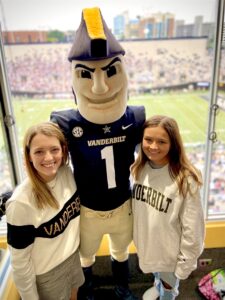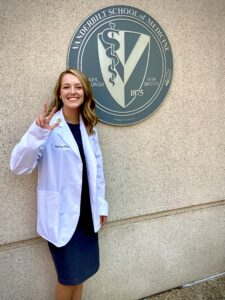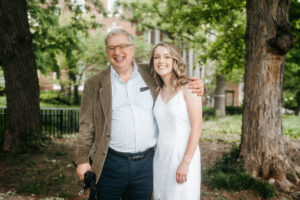As she sat in hospital rooms at Monroe Carell Jr. Children’s Hospital at Vanderbilt as a child, Sydney Nelson dreamed of being a doctor like the faculty at Vanderbilt University School of Medicine
By: Lexie Little

Sydney Nelson walked into a patient exam room with Dr. Thomas Doyle, the Ann and Monroe Carell Jr. Family Professor of Pediatrics and pediatric cardiology specialist. Then an undergraduate student at Vanderbilt University, Nelson shadowed Doyle as he made rounds at Monroe Carell Jr. Children’s Hospital at Vanderbilt. She listened intently as he spoke to a patient’s family. Doyle took out a pen and drew a heart diagram for the family, explaining in plain and accessible terms what heart problem the patient faced.
Then, she felt a sense of déjà vu.
A decade of memories rushed through Nelson’s head as she watched Doyle do for another family what he had done for hers years ago when her younger sister sat on the table for examination.
“When I was five, my parents had my younger sister Emily, who was born with transposition of the great arteries, pulmonary stenosis, and atrial and ventricular septal defect,” Nelson said. “I didn’t know what any of those words meant when she was born. She was born at a different hospital, and understandably, the team saw fit to immediately transfer her to Vanderbilt.”
In layman’s terms, Emily Nelson’s two main arteries leaving the heart were reversed with a valve too small and narrow that restricted the flow of blood. Little holes dotted the walls that separated her heart into the right and left sides.
That day, the room filled wall-to-wall with people wearing white coats and scrubs, all talking about the tiny patient in the clear neonatal incubator. Nelson sat in awe of the teams talking about her sister.
“With her, we were always going to different doctor’s appointments, especially her cardiology appointments,” Nelson said. “I loved going to those because even though I didn’t understand very much of it, I thought the echocardiogram was so cool. Hearing the heart and hearing her doctor use words I didn’t know [interested me]. At the time, I didn’t realize how scary the situation was for my parents.”
As the attending physicians led residents and medical students through presentations of her sister’s case, they used the opportunity to teach about a rare heart defect. But they didn’t just teach the future doctors and specialists – they were teaching the apprehensive and concerned family, too.
Nelson remembered her sister’s appointments with Doyle as a young child. She said he and other physicians took time to check in on her family, recognizing the great stress they faced in acknowledging the danger of her sister’s conditions.
“I remember being really young, and he asked how I was doing,” she said. “I was really little at the time and thought, ‘Why is this man asking me how I’m doing?’ I don’t remember this, but my mom says he gave me a little toy. To my parents, he always stood out. It was really special because when I was an undergraduate student at Vanderbilt, I got to shadow him. It was so awesome to see it from the other side because when I was little, doctors would draw out a heart diagram and explain the heart to my family, and when I was shadowing him – the very first patient – he immediately pulled out a little piece of paper and started drawing the heart. It was such a full circle moment.”
Nelson knew she wanted to pursue a life in medicine around age 12, shortly after one of her sister’s major surgeries. A little older than when she first encountered cardiology, she then realized the serious reality of her sister’s condition and the toll it had taken on her family. She felt that anxiety first-hand and resolved to be a doctor herself, one that could help not only the patients, but the families.
And where better to train than Vanderbilt University School of Medicine?
“I want to help people when they feel the way my family felt,” Nelson said. “When I think of the type of doctor I want to be, it’s like Emily’s doctors at Vanderbilt – like Dr. Doyle and the ones that I have seen through shadowing and research. You play like you practice, [and] I want to be like them one day. One thing I liked that was emphasized [to me] later: a medical student told me that Vanderbilt faculty don’t want to just train a future doctor, they want to train a future colleague. I wanted that culture where you are truly a future colleague that these people want to work with.”
 When she applied for medical school, she remembered all the white coats, long and short, rotating in and out of rooms where her sister and a first cousin with cystic fibrosis – a progressive, genetic disorder affecting the lungs and other organs – stayed. Medical students would ask their residents and attendings if they, too, could listen to her sister’s heartbeat and cousin’s breath sounds.
When she applied for medical school, she remembered all the white coats, long and short, rotating in and out of rooms where her sister and a first cousin with cystic fibrosis – a progressive, genetic disorder affecting the lungs and other organs – stayed. Medical students would ask their residents and attendings if they, too, could listen to her sister’s heartbeat and cousin’s breath sounds.
Nelson appreciated the care that teaching hospitals fostered.
“One thing we always appreciated, especially at Children’s, was that they were teaching the patients about their conditions but also helping to train [the next generation],” she said. “I felt Vanderbilt was so invested in the patients and in the teaching, which helped to promote an atmosphere of care for everyone involved.”
The Nelsons grew to love Vanderbilt, so much so that Syndey applied to VU for her undergraduate studies in neuroscience with a minor in history. She never imagined the opportunities that awaited her like shadowing Doyle and working as a volunteer in the emergency department.
Nelson received encouragement and mentorship from professionals in all disciplines, preparing her for success as a medical school applicant.
“…Vanderbilt faculty don’t want to just train a future doctor, they want to train a future colleague.”
“I think the culture is so unique at Vanderbilt,” she said. “People really care about mentoring the people coming up behind them. Vanderbilt as a whole really has that supportive culture. [For example], my history adviser, Dr. Schwartz, was really invested in my medical school journey. He knew some about the process because his daughter had been a medical school applicant.”
Schwartz, a distinguished professor of history, serves as the director of undergraduate studies in the Department of History. In his role, he advises a number of students, lending a guiding hand to students during their academic experience. His ability to guide students earned him the Madison Sarratt Award for Undergraduate Teaching in 2013.
Schwartz wrote a letter of recommendation for Nelson in May of 2020.
“Having my own daughter apply to medical school, and now finishing her third year, has made me very appreciative of the challenges involved in the application process, as well as the qualities necessary to succeed in that environment,” Schwartz said in the letter. “Sydney Nelson has these in spades. She is very disciplined, highly intelligent, and personally engaging, and I recommend her enthusiastically for admission to medical school.”
Schwartz and Nelson first met when she took his History 1740 course on the history of the Vietnam War. When she earned an A on the midterm exam, Schwartz emailed her to congratulate her on the achievement. That message led to an office hours conversation in which Nelson detailed connections between the course materials and her grandfather’s experience as a Vietnam veteran. Her enthusiasm and engagement with the course material prompted Schwartz to recommend she consider graduate school for history.

“After I suggested that Sydney consider going to graduate school in history, she told me about her motivation to go to medical school,” he said. “Her sister has lived with a dangerous heart condition, and Sydney learned from an early age about the dedication and commitment of medical workers.”
That dedication to people came across even in her history courses, where Schwartz said Nelson’s presence and engagement helped other students in their own pursuits and made class memorable. She showed interest and care in classmates and visitors alike.
“When I invited a group of Vietnam veterans to visit the course, Sydney asked some of the most penetrating questions, and stayed long after class to talk with the men,” Schwartz said, referring to Nelson’s investment in other people that would serve her well in the medical field.
Beyond her regular studies, Nelson also participated in research in a pediatric neurology lab led by Dr. Kevin Ess. For the first time, she witnessed how academic medicine informs patient care through discovery and innovation.
She said the culture at Vanderbilt permits access to different experience with which “few places could compete,” including all aspects of academic study, patient care, and research.
“I really like that you’re helping patients but you’re also working to make the field better for future patients. You can touch a lot of lives that way, even after you’re long done with medicine,” she said of academic medical research, something she looks forward to pursuing as a part of Vanderbilt’s MD Curriculum 2.0.
Each Vanderbilt MD student completes a research immersion experience related to health care or medical inquiry in their third year. But first, students must pass their basic course requirements like anatomy.
The cardiovascular system, naturally, has always interested Nelson, who thought she might be squeamish when feeling it with her own hands during her anatomy lab. But that tactile experience surprised her.
“It’s the first time I’ve had a chance to learn with my hands, which is part of why I’m starting to think I may want to go into surgery,” she said. “I wasn’t expecting that. I want to do something pediatric. I’m really interested in surgery, and I am still interested in cardiology, so I’m excited for next year [on clerkship rotations] to see what I like practically. Pediatric cardiology is really all I have a [personal] background in, so we’ll see.”
Growing up, Emily teased Sydney when she said she wanted to be a pediatric cardiologist or a cardiothoracic surgeon. The heart was “her thing,” after all. But the youngest Nelson sister’s claims didn’t deter the future doctor.
The COVID-19 pandemic forced Nelson’s medical school interviews to virtual spaces. At the same time, her sister sat nearby, working remotely on her high school classwork.
“She would listen and roll her eyes when she would hear me talk about her,” Nelson said. “I talked about her in every interview. When I ultimately received my acceptance to Vanderbilt, she half-jokingly said, ‘It’s because of me. You’re welcome.’ I think she thinks it’s cool.”
Though career paths within medicine remain wide open to Nelson, she knows she wants to care for her patients and families with as much attention and empathy as her sister’s doctors demonstrated more than a decade ago – because regardless of specialty, all care starts at the heart.